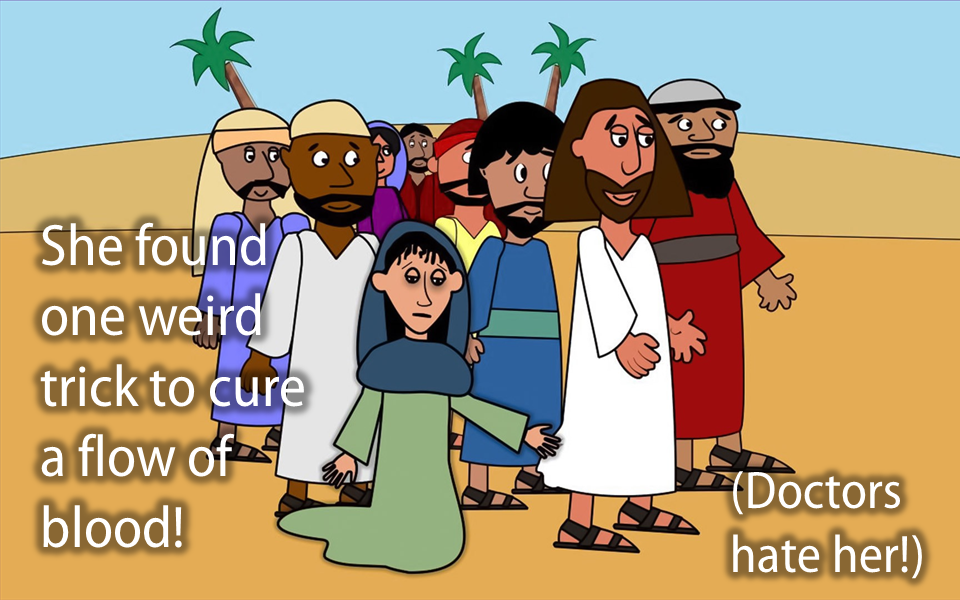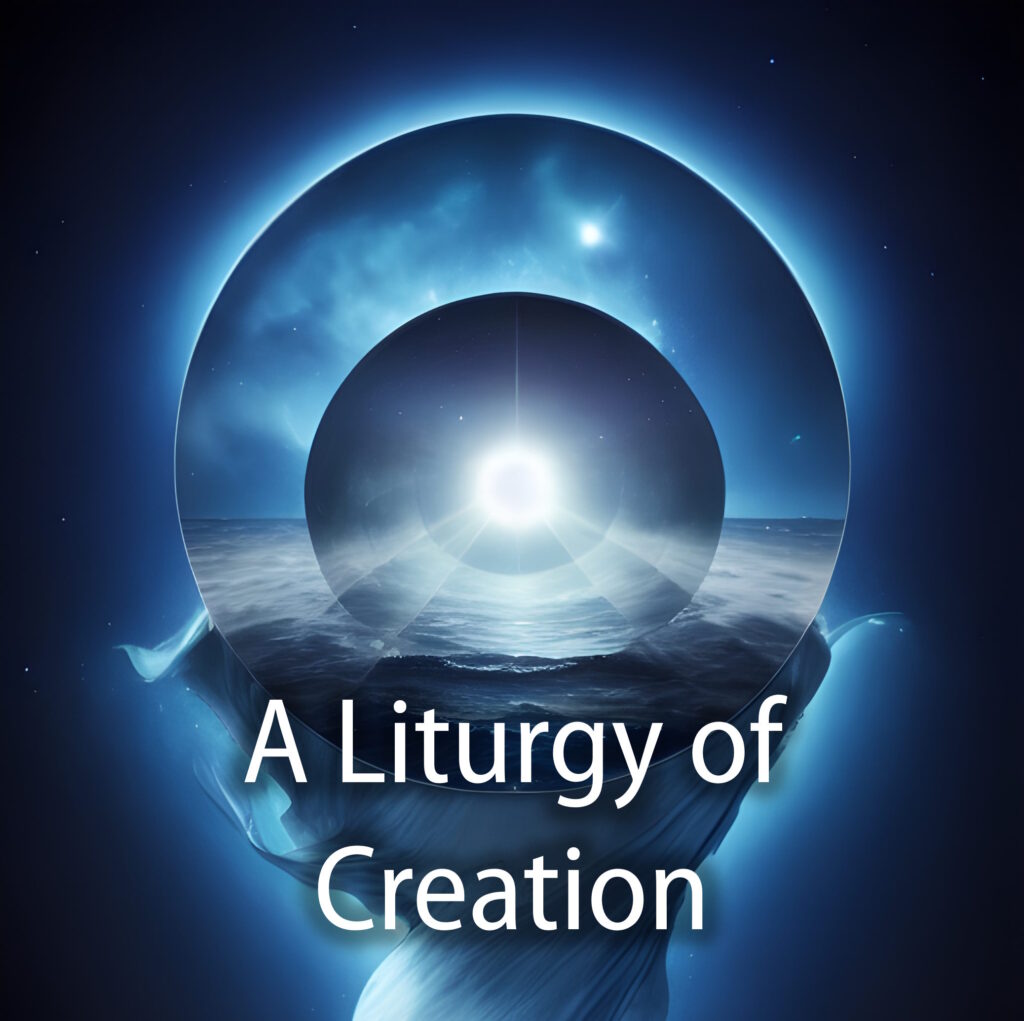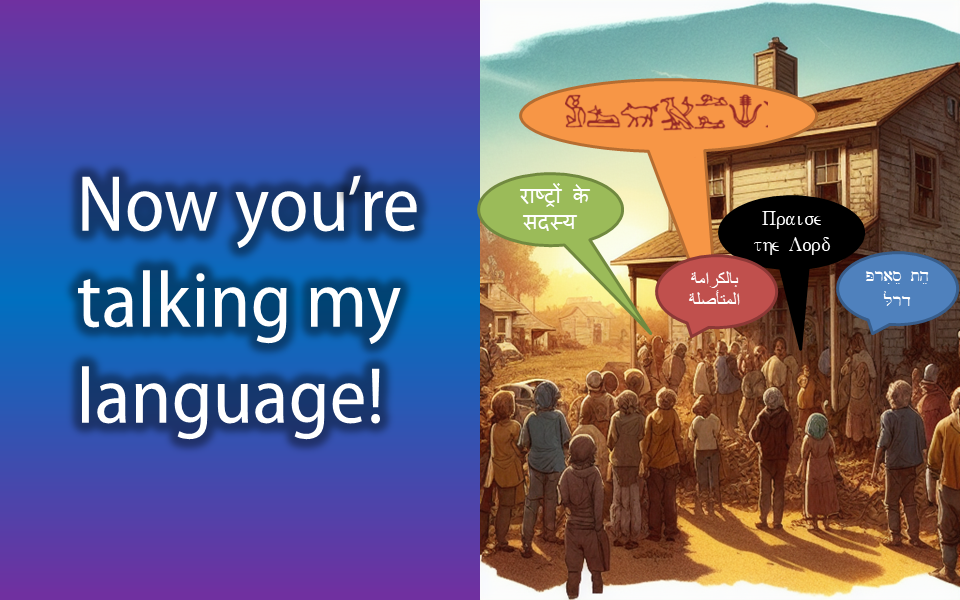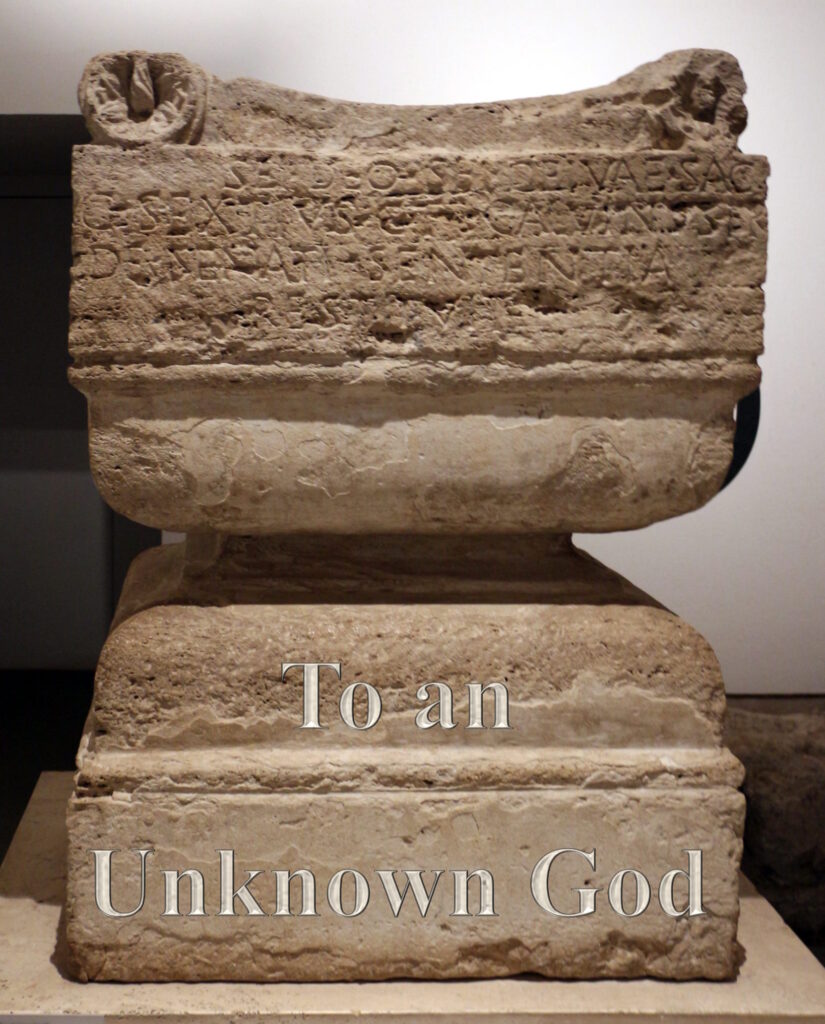Hespeler, August 6, 2023 © Scott McAndless – Tenth Sunday after Pentecost
Isaiah 55:1-5, Psalm 145:8-9, 14-21, Romans 9:1-5, Matthew 14:13-21
Earlier this summer, the Southern Baptist Convention – the national body of the largest Protestant denomination in North America – made a controversial decision. The Southern Baptists voted to expel two of their congregations, one of which was their largest: Saddleback Church.
Amazingly, this did not have anything to do with the sexual abuse scandal that has rocked that denomination for the last few years. No, apparently the congregations were exiled for permitting something much, much worse. They were expelled because they had chosen to have women on staff as pastors.
And I would note that women pastors are not necessarily a new thing in such churches. Many Baptist congregations have had women employed as pastors for a very long time. In fact, one of the congregations that was expelled, Fern Creek Baptist Church of Louisville, Kentucky had had the Rev. Linda Barnes Popham as their senior pastor for three decades before being kicked out!
A Crackdown
This decision is part of a reactionary crackdown within that denomination – a retrenchment as the church reacts to a time of crisis. You see, the Southern Baptist Convention might be the largest denomination, but it is also the one that is declining the fastest. I know that lots of denominations are in decline these days, including our own, and I do not rejoice or crow over any of it. But the decline they are facing is rather stunning. The Presbyterian Church in Canada is getting smaller, but the SBC loses more members than are in the entire PCC every few months!
And so, what has happened is that a reactionary conservative group has seized power and is intent on taking the church back to a time long before the decline began – back to a time when, they might say, women knew their place and it wasn’t in leadership.
It is not a new idea. It is a very, very old idea that has been with the church for a very long time. It is the idea that certain sorts of people don’t count, not when you really want to build a church.
An Odd Ending
Haven’t you always wondered about the end of the story of the feeding of the five thousand? The story is told in all of our gospels, and it ends in the Gospels of Matthew and Mark with a count of those who ate. The counting is obviously really important. It is a way of making it clear that a great miracle has occurred.
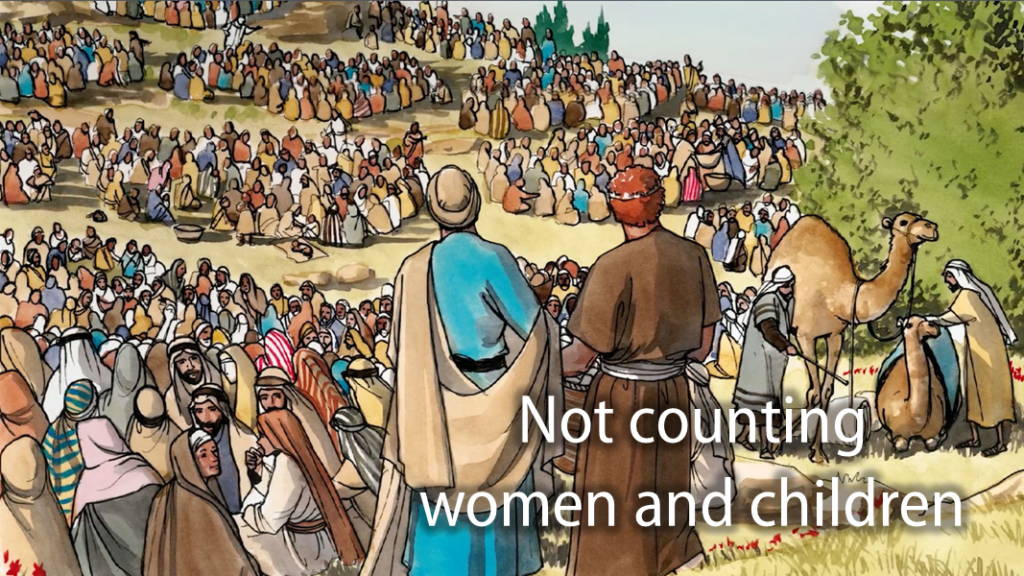
The story ends like this in the Gospel of Mark: “The number of men who were fed was five thousand.” (Mark 6:44) But the Gospel of Matthew ends with an explicit detail found nowhere else. He puts it like this: “The number of men who ate was about five thousand, not counting the women and children.” But I have to ask the question, why not count the women and the children? If the point of this story is to show us the great wonder that Jesus performed, why exclude so many people from your accounting?
Why Would You Understate the Numbers?
Every politician, every organizer and certainly every preacher I have ever heard has always tended to overstate, not understate, the size of a crowd. Donald Trump was kind of famous for it and if ever the media tried to correct the record with a more realistic estimate, he would attack them relentlessly for it. And yet here we are told that the gospel writer could not be bothered counting part of the crowd.
Interpreters have come up with various theories for how many people would have been in the crowd if there were 5,000 adult males. Not everyone agrees, but I’ve seen some commentators who’ve made a study of the demographics of early first-century Galilee estimate that this could mean a crowd as big as 15 to 20,000 people. If you knew that the crowd was as big as that, why on earth would you not bother to count three-quarters of them?
Is it Because Certain People don’t Count?
Why indeed? I believe that it comes back to the issue that I started with – an idea that is obviously much older than the most recent meeting of the Southern Baptist Conference. The idea has long been built into the very foundation of the church that certain people don’t count, or at least don’t count the same.
The notion that women don’t count has deep roots. And I feel that I must say that I don’t believe that it is something that comes from Jesus or from God or even the true nature of the church.
Jesus’ Self-Care
We see where Jesus’ concerns lie at the beginning of this story. He is going through a very rough time. He has just learned that John the Baptist who, to a certain extent at least, seems to have been a kind of mentor to Jesus, has been murdered by Herod. Of course this is hard and of course Jesus, who Christian doctrine teaches us is utterly human no matter what else he is, feels this deeply.
And so, he needs a little bit of self-care. He heads off to a deserted place on a boat, hoping, no doubt, for a little bit of time to reflect and meditate. But his self-care is interrupted by the needs of the great mass of the people who come looking for him, even though they have to walk a great distance to find him.
Jesus’ Care for All the People
And, as much as he may need some time alone, as much as he is aware of his own needs, Jesus recognizes the need to care for the people – all of the people. When he saw them, “he had compassion for them and cured their sick.” And when he heals them and goes on to feed them, he quite clearly does not fail to count all of them. He does not simply provide for the most important or the most powerful. He certainly doesn’t feed or heal only the men. Obviously, for Jesus, the women and the children count, as do their needs.
So, if it didn’t start with Jesus, where does it come from? Why, by the time that this gospel was written, had people stopped counting the women and the children? Well, it had everything to do with the society and culture in which the early church found itself. There is lots of evidence that shows that the early church did count women. It counted them among the leadership, with women named as apostles and leaders of churches. That is why the Apostle Paul could say things like, “There is no longer male and female, for all of you are one in Christ Jesus.” (Galatians 3:28)
A Patriarchal Society
But the early church found itself in a culture, dominated by the Roman Empire, that was extremely patriarchal. Such a culture found the very idea of counting women – or at least giving them any significance – to be offensive.
And, by the time that the Gospel of Matthew was written and by the time that some of the later letters of the New Testament were written, that attitude had begun to drift into the church as well. Basically, the church began to feel that it needed to go along to get along. And, in many ways, that attitude continued to affect the church for many centuries. And, as we see in recent decisions by the Southern Baptist Conference, among others, it hasn’t really gone away.
Who We Count
It does mean a lot to me to be part of a church, and a denomination, that has done some serious work on counting women, on truly recognizing and appreciating their contribution, over the last few decades. I also appreciate the steps that we have taken to count others who were excluded from our accounting for way too long.
But I do not think that we can or should just lean back and put our feet up and assume that the job is done. I believe we will always encounter a cultural tendency not to count certain kinds of people, and as long as we do that, we will be missing out on a true picture of what God is doing among us.
People Sitting in Pews
For example, for a very long time, the impact of a church such as ours was measured by only one metric – by the number of people sitting in pews for one particular hour on a Sunday morning. Congregations that had lots of people sitting in the right places at the right time every week were considered to be successful congregations that were having real impact.
Even back then, this was not necessarily an accurate measure of the liveliness of a church. There were lots of people who were vital to the church who were not counted – people who were teaching Sunday school, people who had some pretty good reasons for why they couldn’t be there at that time, but that were great supporters of the church in other ways.
Old Assumptions No Longer Work
So, it was never quite accurate, but these old assumptions have become even more problematic because of recent developments. Now we have people who attend our worship services online through Zoom or through Facebook Live. Others watch the videos of sermons and other elements of our worship at another time than that extra special hour that was once the only one that mattered. Some of them do that from great distances away – all over the globe, in fact. Do they count? Are they part of the life and work of our church? Of course they are, but we do not often count them.
But there is more than that. There are all kinds of people in this community for whom this church is part of their spiritual life and for whom this congregation helps to meet both their spiritual and physical needs, and yet we have never seen them during the magic hour on a Sunday morning. Maybe we never will.
Who is Part of our Church?
I’m talking, for one thing, of those who come in for a good meal, to pick up some food from the Food Bank or our Community Cupboard. I’m talking about people who need help to get decent clothing for their families. This church is their church too and it meets their needs. The very fact that they are welcomed warmly here and treated without judgement absolutely feeds their souls as well as their hungry stomachs. If you asked them what they know of the church, they will speak well of St. Andrew’s. But do we count them? We do not.
I am also talking, by the way, about the amazing army of volunteers that keeps our ministries operating. Many do not worship here but they also have formed an amazing society of mutual support and encouragement and surely that is what the church is supposed to be about. Recently, for example, one of our Hope Clothing volunteers suffered the sudden death of her spouse. I know that she found the support that she received from her fellow volunteers to be invaluable.
Undervaluing Volunteers
I was talking with the people from the Food Bank recently, and they were noting just how seriously we undervalue the contribution of such volunteers. If you were to put a dollar value on it – and they are working up some models to help to put a dollar value on it – it works out that this church is making an additional contribution of thousands of dollars every year to this community. This is the mission of the church.
These are all people who are living out the mission of the church and doing it admirably. Are you going to tell me that they don’t count because they have never sat in a pew? That would be ridiculous, wouldn’t it? And yet we seem to assume all the time that that is how things are.
A History of Not Counting Some
The church, sadly, has a long history of not counting certain people. For centuries women didn’t really count, even as they often did the greatest part of the work in many churches. For centuries members of certain minority racial, ethnic or language groups didn’t count.
Oh sure, we were happy enough to include them in our statistics when it made us look good, but we didn’t seem to believe that they could really contribute anything of value. Their theological reflections were often simply dismissed.
Work Yet to be done
I’m glad to say that our church today has learned better about such things. But we still do fall into the temptation of not counting certain people. We say we would love to welcome families with children, for example, but can have a hard time making space for families that don’t quite fit into the pattern of families that we are used to.
Imagine those people who went out to find Jesus when he set off to be alone after he heard of the death of John. Those people are a picture of the whole of the church. They are gathered, as we are gathered, for one reason alone – because the compassion of Jesus met them where they were. Each one was met according to their need. Each one given a role in the ministry according to his or her ability. And they all counted. They all count. So, we must always be careful about who we don’t count.



